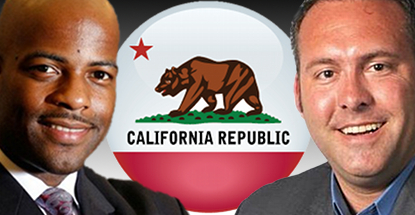California online poker advocates have two more pieces of legislation to consider, courtesy of state Sen. Isadore Hall III (pictured left) and Assemblyman Adam Gray (on the right). The pair of Democrats introduced identical legislation – SB 278 and AB 431 – in the Senate and Assembly on Thursday.
The bills are just three pages long and woefully short of specifics, apparently intended to serve as placeholders in order to beat the Feb. 27 cutoff for consideration in the current legislative session. Two other bills – AB 9 and AB 167 – have already been introduced by Assemblymen Mike Gatto and Reggie Jones-Sawyer, respectively.
Hall and Gray each chair the Governmental Organization Committee in their respective chambers, giving them a lot of influence over the path to passage of any gambling legislation. The pair issued a statement saying their bills “do not create winners and losers” or “take one entity’s side over another.” The pols urge stakeholders to “work together, stop bluffing and take control of this issue.”
CAESARS’ BAD ACTORS SHIFT REFLECTS BELIEF THAT TRIBES CALL THE SHOTS
Meanwhile, Caesars Entertainment VP Jan Jones Blackhurst has shed more light on her company’s decision to drop their longstanding antipathy towards ‘bad actors’ i.e. companies that continued to accept wagers from US residents following passage of the UIGEA in 2006. For poker companies seeking to do business in US regulated online gambling markets, bad actors more specifically refers to online poker’s 800-pound gorilla, PokerStars.
In an interview with PokerNews, Jones Blackhurst said Amaya Gaming’s 2014 purchase of PokerStars’ parent company had brought about “a total cleansing of the company.” Jones Blackhurst also believes concerns over Stars being able to use its famed customer database had lessened given that it’s been nearly four years since Stars was forced to leave the US market post-Black Friday.
Jones Blackhurst said Caesars’ newfound acceptance of Amaya-Stars was at least in part due to the shifting ‘bad actor’ position of the Rincon Band of Luiseño Indians, with whom Caesars has partnered in California. Jones Blackhurst acknowledged that in California, “the tribes call the shots” and that Caesars had been made aware of the new position the Rincon, Pala and United Auburn Indian Community planned to adopt.
